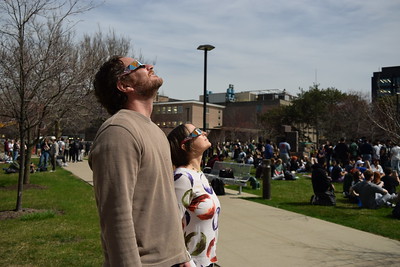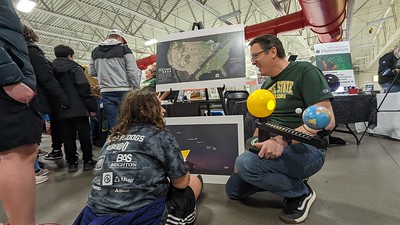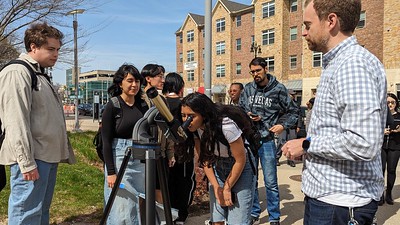Eclipse aftermath
On Monday, Apr. 8, 2024, Wayne State University's campus bore witness to a rare celestial phenomenon—a partial solar eclipse—a sight not to be seen again in Michigan until 2099.
This captivating event saw 99.5% of the Sun's radiant disk obscured by the passing moon. The campus buzzed with excitement as students and faculty alike donned eclipse glasses, spread out blankets in the courtyards for optimal viewing or gathered around strategically positioned telescopes courtesy of Dr. Matthew Gonderinger, eager to catch a glimpse of the cosmic spectacle up close. While many gathered in Wayne State's campus to witness the eclipse, numerous professors and graduate students embarked on global journeys in pursuit of the eclipse totality view.
Recognizing the significance of the eclipse, faculty members made concerted efforts to educate the public, secure telescopes for observers and ensure everyone had the opportunity to witness this extraordinary event firsthand.

Planetarium Director Dr. Megan McCullen and ProfessorBill Llope were among the educators disseminating knowledge about the eclipse on a global scale. Reflecting on the historical significance of eclipses, Llope remarked, “Our ancestors interpreted eclipses as signs of divine anger and monsters ready to attack. Today, we recognize them as goofy geometrical coincidences on a celestial scale, which look very cool.” Also, animals get confused, which is always funny.”
Dr. McCullen ensured that eclipse-related topics were covered during Planetarium shows, emphasizing the importance of real-life experiences in educational outreach. She noted, "Experiencing the eclipse firsthand makes the information more meaningful and memorable for students. It also heightened my awareness of solar astronomy. We talked about using solar scopes to view the sun, but the experience gave me more of an appreciation for solar astronomy and finding different ways to view the Sun. There are solar astronomy binoculars and I’m thinking of purchasing them”.
Dr. McCullen was also instrumental in spearheading outreach initiatives beyond Wayne State University to raise awareness about the total eclipse. One such event took place at the USA Hockey Arena, where a Solar Eclipse glasses giveaway was organized. Reflecting on the event, Dr. McCullen remarked, "We had several kids come by to marvel at telescopes and globes, with many spending considerable time engaging with Dr. Cackett, asking questions. We even had alumni drop in!
Our aim is always to forge connections with new community members and the eclipse ignites interest in astronomy among people. Being able to meet them where they are is crucial. It helps draw the general public into the Planetarium or the department." In addition to this event, Dr. McCullen collaborated with the Detroit Public Library for a virtual lecture series. Detailing the effort, she explained, "Our presentations focused extensively on eclipses and the art of astrophotography, equipping the public with resources to prepare for the event. This series has been ongoing since 2020."

After attending outreach events, Dr. McCullen and Professors Llope and Gavin traveled to Ohio to see the eclipse totality and experience the changes in the environment around them. McCullen highlighted the eclipse's multifaceted impact, stating, “The eclipse has all sorts of impacts, on things such as weather and animal behavior. The moon's shadow only covers a 115-mile-wide path on Earth - a narrow band that feels these effects.
This year you could see Jupiter and Venus. Feeling the changes the eclipse creates is more significant than seeing it simulated in a Planetarium. It is a very physical experience.” Dr. Llope opted for a different viewing location, sharing, “We found ourselves in a Kroger parking lot in Waterville, OH, accessed via scenic backroads. Everything was so smooth and easy. We took out our mitts and threw a softball around in the parking lot while we waited for the Angry Gods/Inbound Monsters event. Two minutes and six seconds of totality ensued. There are no words to describe the experience. The whole day was a miracle. I won’t ever forget it.”
While Ohio offered the closest view of eclipse totality to Michigan, some students and faculty chose to observe it from various locations across the country. Dr. McCullen explained, "The Society for Physics students accepted an invitation from their peers in Cleveland, OH, while some of our Astronomy faculty attended a conveniently scheduled research conference situated within the path of totality.
Additionally, members of the geology and environmental science department, including Dr. Burdick, their geophysicist, embarked on a mineralogy field trip in Missouri, also within the path of totality." For those who remained in Detroit, both faculty and graduate students worked tirelessly to ensure that the campus experience was just as captivating and awe-inspiring.

Dr. Matthew Gonderinger and the graduate students meticulously selected telescopes and strategic locations for optimal eclipse viewing. Explaining the significance of these telescopes, Dr. Gonderinger noted, "Similar to eclipse glasses, the solar telescopes we utilized are designed to safely block most of the Sun's light, allowing for direct viewing without eye damage.
However, these telescopes offer additional advantages. Firstly, they provide magnification, rendering the Sun larger and more detailed. Secondly, they feature a tunable filter enabling transmission of the hydrogen-alpha wavelength emitted by the Sun. This unique capability allows observers to witness sunspots and solar prominences, which are not visible through eclipse glasses."
Regarding the telescopes' placement across the campus, Dr. Gonderinger elaborated, "I strategically positioned them in very public, high-traffic areas. I wanted as many people as possible to have a chance to view the eclipse through the telescopes – even if they were just passing by on their way to a class or meeting. Of course, it was also important that the locations have a view of the Sun unobstructed by buildings or trees at the time of day when the eclipse occurred!”
If the eclipse has sparked your interest or if you're intrigued by other astronomical events, Wayne State University continues to offer educational opportunities for enthusiasts. You can attend publicly held Planetarium shows every Friday at 6 and 7:30 p.m.
For those seeking eclipse-related information, Dr. Megan McCullen highlights, "Eclipses occur regularly worldwide, but witnessing one locally is a rare occurrence. Some faculty and alumni actively pursue these events and after my recent experience, I'm inclined to do the same. Australia and New Zealand are set to experience a total eclipse in 2028, which I'm keen on attending!"
Learn more about the next nearest eclipse event coming to Earth.